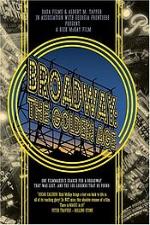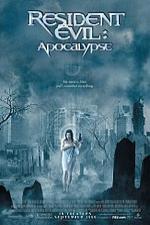

Knight at the Movies ARCHIVES

A Glorious Documentary and Something for the Kids :
Broadway: The Golden Age, Resident Evil: Apocalypse
9-15-04 Knight at the Movies column
By Richard Knight, Jr.
The documentary Broadway: The Golden Age is both great theatre and a great movie. What could be
more theatrical than one man alone with a camera crisscrossing the country, sleeping on friend’s couches, selling
off his furniture to get more money to keep going, spending five years amassing interviews and ending up with the
certifiable 100 legends onscreen here? Rick McKay directed, wrote, shot and edited the film and his real life
“Impossible Dream” of documenting the story of New York theatre’s halcyon period (the 40s through the late 60s)
has been beautifully realized.
On the surface, of course, the reason this is THE movie for theatre queens and show tune folk alike is the distinct
frisson of seeing so many bona bide legends collected together (from Bea Arthur to Gwen Verdon in her last on
camera interview). It made me recall the giddy pleasure of seeing That’s Entertainment for the first time and the
not so subtle stargazing fun afforded in Robert Altman’s The Player. This is literally a Night of 100 Stars – but
they’re all talking and the stories these actors tell are very compelling. The movie is a wonderful history of the
cultural phenomenon that was Broadway and an invaluable document (in the time that McKay worked on the film
several performers passed away).
At the beginning of Broadway: The Golden Age we are given a brief synopsis (accompanied by home movies) of
McKay’s life. Born, but unfortunately not in a trunk, in Beech Grove, Indiana, the openly gay filmmaker, inspired by
the movie versions he saw of Broadway theatre life (like The Bandwagon and All About Eve) headed for New York
in the early 80s just as the British Invasion of Cats, Les Miz and Phantom took over the theatre district. He
eventually decided to start tracking down what happened to the Great White Way (which we are shown in rare
home movies and stock footage from the 40s through the 60s). Not knowing what a Herculean task he had set for
himself, McKay began trying to line up interviews.
From that point on, basically the movie is one talking head after another interspersed with rare footage of the
shows and forgotten personalities (Laurette Taylor for example). There are familiar tales: Shirley MacLaine, the
understudy going on in “Pajama Game” for the ailing star Carol Haney and being discovered by Hollywood but this
story – along with others – is relayed with fresh details (MacLaine’s tennis shoes were dyed black in the basement
for the “Steam Heat” number while she was onstage and they were still wet when she put them on) and there is
the added perspective of star John Raitt and others who were in the audience.
The many audacious stories in the film are broken down into various sections that neatly collect them (“The Big
Break,” “Getting The Job,” etc.). One category (“Camaraderie”) gets at the underlying reason why Broadway will
never be the same (and gives the movie a lot of depth). Carol Burnett relates a story about how she and her
roommates each contributed $5 dollars toward what they called “the audition dress” – whoever got the first
appointment time got to wear it – that vividly illustrates the mutual sense of community. Shared nightspots, diners
and drugstores (especially Walgreen’s) are individually recalled. The longing for that community is still palpable.
If there is a quibble it’s because McKay’s story disappears from the movie (though, on after thought, that’s because
making this movie became his life) and that this feast of personalities leaves one more than a bit hungry for more
of each (a forthcoming DVD is sure to address that). A sequel that will focus on recent Broadway performers (like
Patti LuPone and Audra McDonald) arrives next year. In the meantime, Broadway: The Golden Age is the hottest
ticket in town. Movie ticket, that is.
++++++++++++++++++++++++++++++++++++++++++++++++++++++++++++++++++++++++++++
Resident Evil: Apocalypse is proof that certain movies and computer games are becoming indistinguishable
(and it’s getting harder to tell which came first). This sequel to the sci-fi dead zombie hit (both star cover girl
turned action priestess Milla Jovovich) has more than a few elements cribbed from Escape From New York, and
the Dead series (especially Day of the Dead) but adds the visceral excitement of a PlayStation game. What
fascinated me most was actress Sienna Guillory who plays a character name Jill Valentine. In looks, manner and
especially, action, I had moments where I wondered if she WAS computer generated. That might as well be taken
as a compliment by all concerned as I’m sure that was the intent. I would suggest that the sequel to this (a given)
become more interactive and drop the movie pretense – controllers should be handed out so that audiences can
play along. Prizes could be awarded to those with the most zombie kills.
Broadway: The Golden Age, Resident Evil: Apocalypse
9-15-04 Knight at the Movies column
By Richard Knight, Jr.
The documentary Broadway: The Golden Age is both great theatre and a great movie. What could be
more theatrical than one man alone with a camera crisscrossing the country, sleeping on friend’s couches, selling
off his furniture to get more money to keep going, spending five years amassing interviews and ending up with the
certifiable 100 legends onscreen here? Rick McKay directed, wrote, shot and edited the film and his real life
“Impossible Dream” of documenting the story of New York theatre’s halcyon period (the 40s through the late 60s)
has been beautifully realized.
On the surface, of course, the reason this is THE movie for theatre queens and show tune folk alike is the distinct
frisson of seeing so many bona bide legends collected together (from Bea Arthur to Gwen Verdon in her last on
camera interview). It made me recall the giddy pleasure of seeing That’s Entertainment for the first time and the
not so subtle stargazing fun afforded in Robert Altman’s The Player. This is literally a Night of 100 Stars – but
they’re all talking and the stories these actors tell are very compelling. The movie is a wonderful history of the
cultural phenomenon that was Broadway and an invaluable document (in the time that McKay worked on the film
several performers passed away).
At the beginning of Broadway: The Golden Age we are given a brief synopsis (accompanied by home movies) of
McKay’s life. Born, but unfortunately not in a trunk, in Beech Grove, Indiana, the openly gay filmmaker, inspired by
the movie versions he saw of Broadway theatre life (like The Bandwagon and All About Eve) headed for New York
in the early 80s just as the British Invasion of Cats, Les Miz and Phantom took over the theatre district. He
eventually decided to start tracking down what happened to the Great White Way (which we are shown in rare
home movies and stock footage from the 40s through the 60s). Not knowing what a Herculean task he had set for
himself, McKay began trying to line up interviews.
From that point on, basically the movie is one talking head after another interspersed with rare footage of the
shows and forgotten personalities (Laurette Taylor for example). There are familiar tales: Shirley MacLaine, the
understudy going on in “Pajama Game” for the ailing star Carol Haney and being discovered by Hollywood but this
story – along with others – is relayed with fresh details (MacLaine’s tennis shoes were dyed black in the basement
for the “Steam Heat” number while she was onstage and they were still wet when she put them on) and there is
the added perspective of star John Raitt and others who were in the audience.
The many audacious stories in the film are broken down into various sections that neatly collect them (“The Big
Break,” “Getting The Job,” etc.). One category (“Camaraderie”) gets at the underlying reason why Broadway will
never be the same (and gives the movie a lot of depth). Carol Burnett relates a story about how she and her
roommates each contributed $5 dollars toward what they called “the audition dress” – whoever got the first
appointment time got to wear it – that vividly illustrates the mutual sense of community. Shared nightspots, diners
and drugstores (especially Walgreen’s) are individually recalled. The longing for that community is still palpable.
If there is a quibble it’s because McKay’s story disappears from the movie (though, on after thought, that’s because
making this movie became his life) and that this feast of personalities leaves one more than a bit hungry for more
of each (a forthcoming DVD is sure to address that). A sequel that will focus on recent Broadway performers (like
Patti LuPone and Audra McDonald) arrives next year. In the meantime, Broadway: The Golden Age is the hottest
ticket in town. Movie ticket, that is.
++++++++++++++++++++++++++++++++++++++++++++++++++++++++++++++++++++++++++++
Resident Evil: Apocalypse is proof that certain movies and computer games are becoming indistinguishable
(and it’s getting harder to tell which came first). This sequel to the sci-fi dead zombie hit (both star cover girl
turned action priestess Milla Jovovich) has more than a few elements cribbed from Escape From New York, and
the Dead series (especially Day of the Dead) but adds the visceral excitement of a PlayStation game. What
fascinated me most was actress Sienna Guillory who plays a character name Jill Valentine. In looks, manner and
especially, action, I had moments where I wondered if she WAS computer generated. That might as well be taken
as a compliment by all concerned as I’m sure that was the intent. I would suggest that the sequel to this (a given)
become more interactive and drop the movie pretense – controllers should be handed out so that audiences can
play along. Prizes could be awarded to those with the most zombie kills.
An amazing history recalled and a video game masquerading as a movie

